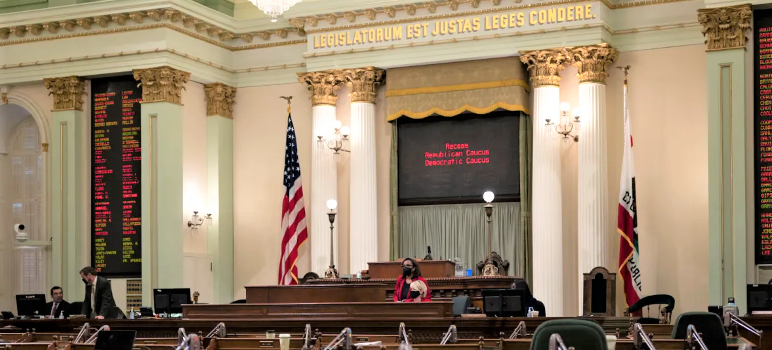As California’s new state Legislature is set to be sworn into office — and to convene a special session focused on oil industry profits — it was still not clear who would occupy two of the seats.
As of last Friday, Democrat Christy Holstege and Republican Greg Wallis each had 50% of the vote for a state Assembly seat straddling Riverside and San Bernardino counties. And Republican David Shepard was leading Democratic incumbent Melissa Hurtado 50.1% to 49.9% for a state Senate seat looping around east Bakersfield, California’s most fiercely contested stretch of political turf.
Shepard told local news outlet GV Wire that he plans to be in Sacramento today, noting that Kern County is California’s largest oil producer: “The fact that there would not be a representative there” at the start of the special session “is a complete and total slap in the fact of the constituents here,” Shepard said.
Hurtado, meanwhile, said she doesn’t plan to join the swearing-in ceremony “unless it’s clear that I’m the winner.”
That state lawmakers could be sworn into office before every race has been called is just another quirk of California’s lengthy vote-counting process, designed to improve accessibility and ensure accuracy but nevertheless a source of frustration for many.
County elections officials have until Dec. 9 to submit their final results, and the secretary of state must certify them by Dec. 16.
But, even with two seats up in the air, history has been made: Californians elected at least 49 female lawmakers and could seat as many as 51 — up from the previous record of 39, set during the legislative session that officially came to a close at the end of Wednesday. Among them: Democrat Jasmeet Bains, who won an Assembly seat representing Bakersfield and will become the first South Asian woman in the Legislature.
Republican lawmakers are highlighting diversity milestones, too: Assembly GOP Leader James Gallagher of Yuba City announced Thursday that Bill Essayli of Riverside will become the first American Muslim to serve in the Assembly, bringing “a unique perspective to the Republican Caucus” along with a “strong criminal justice background.”
Also set in stone: Democrats’ supermajority, which allows them to pass bills and budgets without a single Republican vote. As of Thursday, Democrats controlled 62 of 80 Assembly seats and 31 of 40 Senate seats.
Nearly one-third of lawmakers — at least 37 of 120 — will be new to Sacramento, paving the way for new political dynamics and new legislative priorities. But some legislators are giving us a sneak peek of what to expect during the next session, which will begin in earnest in January after the largely ceremonial swearing-in Monday:
Democratic state Sens. Steve Glazer and Josh Newman said they plan to introduce an urgency bill Monday to exempt federal student loan forgiveness from state income taxes, a move backed by legislative leadership. Whether the federal government will be able to proceed with loan forgiveness is up in the air: The U.S. Supreme Court said Thursday it will review the legality of the plan, which has been blocked by lower courts.
Democratic state Sen. Nancy Skinner said she will unveil a bill to strengthen existing protections for people who come to California “seeking refuge from prosecution by other states that have criminalized abortions or health care that supports and affirms an individual’s gender identity.”
Republican state Sen. Brian Jones announced plans for bills to suspend the state gas tax — which will almost certainly be dead on arrival — and to ban homeless encampments near schools, libraries, day care centers and parks.
The race for California’s last undecided U.S. House of Representatives seat came to an end Friday, when Democratic Assemblymember Adam Gray conceded to Republican farmer John Duarte for the Central Valley slot. California’s new congressional delegation contains 40 Democrats and 12 Republicans, compared to 42 Democrats and 11 Republicans heading into Election Day. (Due to slowing population growth, California lost one House seat after the 2020 Census.)
Emily Hoeven is a reporter with CalMatters.


Why bother counting votes? It’s all a sham anyway.